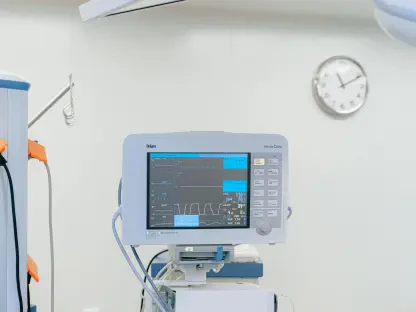In the ever-evolving landscape of healthcare, the US medical billing outsourcing market is emerging as a vital solution for providers grappling with escalating costs and intricate regulatory demands, proving to be a linchpin for operational efficiency. This sector, centered on entrusting tasks such as claims processing, coding, and revenue cycle management (RCM) to third-party specialists, offers a strategic pathway to streamline administrative burdens. A recent comprehensive report highlights that this market is on the cusp of extraordinary expansion, driven by systemic shifts within the healthcare industry. As hospitals and physician offices strive to balance financial constraints with the imperative of quality patient care, outsourcing becomes an indispensable tool. This article explores the forces propelling this market forward, delving into growth projections, regulatory impacts, key segments, technological innovations, and future trends. It aims to provide a clear understanding of why medical billing outsourcing is becoming essential for healthcare providers across the nation.
Driving Forces Behind Market Expansion
The surge in the US medical billing outsourcing market is largely fueled by the urgent need for cost containment among healthcare providers. With operational expenses soaring and profit margins under constant pressure, many organizations find themselves compelled to optimize resources without compromising patient care. Outsourcing medical billing tasks presents a viable solution by reducing the overhead associated with maintaining in-house staff and infrastructure. This approach allows providers to channel their focus and finances toward enhancing clinical services, a priority in today’s competitive environment. Moreover, the financial relief gained through outsourcing is not merely a short-term fix but a strategic realignment that supports long-term sustainability. As healthcare costs continue to rise, the appeal of delegating administrative functions to specialized firms grows, positioning outsourcing as a critical component of financial planning for hospitals and smaller practices alike.
Another significant driver of this market’s growth is the increasing complexity of healthcare regulations and reimbursement structures. The shift to value-based care, where payments are tied to patient outcomes rather than the volume of services provided, has introduced new challenges in billing accuracy and compliance. Third-party providers bring a level of expertise that many healthcare organizations lack internally, ensuring that claims are processed correctly and denials are minimized. This expertise is particularly crucial as regulatory frameworks evolve, often requiring rapid adaptation to new coding standards and documentation requirements. By leveraging the specialized knowledge of outsourcing firms, providers can navigate these complexities more effectively, avoiding costly errors that could jeopardize revenue streams. This reliance on external support underscores a broader trend of partnership in healthcare, where collaboration becomes essential for maintaining financial health amid regulatory turbulence.
Market Size and Growth Trajectory
Current data pegs the value of the US medical billing outsourcing market at USD 6.26 billion as of last year, with projections indicating a remarkable climb to USD 18.88 billion by 2034. This translates to a robust compound annual growth rate (CAGR) of 11.7% over the forecast period spanning from 2025 to 2034. Such figures reflect a profound shift in how healthcare providers approach administrative operations, increasingly turning to third-party RCM solutions to address economic and operational hurdles. This growth is not merely a numerical trend but a signal of deeper systemic changes, where outsourcing is becoming a cornerstone of efficiency. The market’s expansion suggests a growing trust in external partners to manage critical financial processes, allowing providers to focus on their core mission of delivering care. As this trajectory continues, it highlights the transformative potential of outsourcing in reshaping healthcare administration on a national scale.
Beyond the impressive numbers, the growth of this market points to a fundamental realignment within the healthcare sector. The reliance on outsourcing is driven by the recognition that administrative efficiency directly impacts financial stability. Providers, ranging from large hospital systems to small physician offices, are finding that third-party services offer scalability and expertise that internal resources often cannot match. This trend is further accelerated by the ongoing push for digital transformation, where outsourcing firms integrate advanced tools to streamline workflows. The projected tripling of market value over the next decade underscores the confidence in these solutions to address persistent challenges like staffing shortages and reimbursement delays. As the market evolves, it is likely to attract more investment and innovation, further solidifying its role as a vital support system for an industry under constant pressure to adapt and improve.
Key Segments Shaping the Landscape
A closer examination of market segmentation reveals critical insights into the dominance of certain categories. The outsourced component segment emerged as the leader last year, reflecting a clear preference among healthcare providers for external expertise over maintaining in-house capabilities. This trend highlights the strategic choice to offload complex billing processes, freeing up internal resources for patient-facing activities. Similarly, within the services category, front-end operations such as patient registration and insurance verification took the lead, playing a pivotal role in reducing claim denials and enhancing revenue cycle efficiency. These dominant segments illustrate a proactive approach to financial management, where early intervention in the billing process can yield significant returns. The focus on outsourcing and front-end services signals a broader industry shift toward leveraging specialized skills to tackle administrative challenges head-on.
Additionally, the end-use analysis underscores the diverse demand driving this market. Hospitals, with their extensive operations and intricate billing needs, stand out as primary contributors to market growth, relying heavily on outsourcing to manage large volumes of claims. Meanwhile, physician offices and other smaller entities are increasingly adopting these services, seeking cost-effective solutions tailored to their scale. This varied end-use base reflects the universal appeal of outsourcing across different healthcare settings, driven by common issues like limited staff and delayed reimbursements. The ability of outsourcing firms to cater to both large and small providers demonstrates the flexibility and scalability of their offerings. As demand continues to grow across these segments, it becomes evident that outsourcing is not a one-size-fits-all solution but a customizable strategy addressing specific operational pain points within the healthcare ecosystem.
Technological Innovation and Competitive Dynamics
Technology stands at the forefront of transformation in the medical billing outsourcing market, with vendors integrating cutting-edge tools to boost efficiency. Innovations such as artificial intelligence and automation are being harnessed to minimize human error and accelerate claims processing, offering a significant edge to providers struggling with administrative bottlenecks. Leading companies in this space are setting the pace by developing sophisticated platforms that streamline workflows and enhance accuracy in billing operations. These technological advancements not only improve day-to-day processes but also strengthen the overall value proposition of outsourcing, making it an attractive option for healthcare providers looking to modernize. The role of technology in this market cannot be overstated, as it addresses critical pain points while paving the way for future growth and adaptability in an increasingly digital healthcare landscape.
The competitive dynamics of this market further amplify the impact of innovation, as key players continuously push boundaries to meet evolving client needs. Firms are focusing on comprehensive RCM solutions that integrate seamlessly with providers’ existing systems, ensuring minimal disruption during implementation. This drive for innovation is evident in the way companies differentiate themselves through customized offerings, addressing the unique challenges faced by hospitals and smaller practices alike. The emphasis on tailored solutions reflects a deeper understanding of the diverse requirements within the healthcare sector, fostering stronger partnerships between providers and vendors. As competition intensifies, the market benefits from a cycle of continuous improvement, where technological advancements and service enhancements become the norm. This environment of innovation ensures that outsourcing remains a dynamic and forward-looking solution for healthcare administration.
Challenges and Strategic Opportunities
Despite the promising outlook, the US medical billing outsourcing market is not without its challenges, particularly in the realm of data security. With sensitive patient information at stake, providers must ensure that third-party firms adhere to stringent privacy standards to prevent breaches that could undermine trust and compliance. Additionally, the integration of outsourcing solutions with existing systems poses technical hurdles, requiring careful coordination to avoid operational disruptions. These challenges, while significant, are viewed as surmountable through robust partnerships and the adoption of advanced security protocols. Addressing these concerns is crucial for maintaining the momentum of market growth, as trust and reliability remain paramount in healthcare collaborations. The focus on overcoming these obstacles highlights the industry’s commitment to balancing efficiency with accountability in an era of heightened scrutiny.
On the flip side, these challenges open up strategic opportunities for vendors to differentiate themselves through innovation and reliability. Developing secure, user-friendly solutions that prioritize data protection can set firms apart in a competitive market, building long-term trust with clients. Furthermore, the demand for seamless integration presents a chance to create flexible platforms that adapt to a variety of provider systems, catering to both large hospitals and smaller offices. Vendors who can address these pain points effectively stand to gain a significant market share, as providers increasingly seek partners who offer both expertise and dependability. This duality of challenge and opportunity underscores the evolving nature of the outsourcing market, where hurdles are not merely barriers but catalysts for growth and improvement. As the industry navigates these complexities, the potential for tailored, secure solutions continues to drive interest and investment.
Future Horizons in Healthcare Administration
Looking ahead, the US medical billing outsourcing market is poised for sustained evolution, fueled by the ongoing transition to value-based care and the relentless push for operational efficiency. Over the forecast period from 2025 to 2034, growth is expected to remain strong as healthcare providers continue to face financial and regulatory pressures that necessitate external support. Outsourcing firms are well-positioned to facilitate this shift, offering specialized skills in coding, documentation, and analytics that align with new reimbursement models. This alignment is critical as the industry moves away from traditional fee-for-service structures, placing greater emphasis on outcomes and cost-effectiveness. The trajectory suggests a broadening adoption of outsourcing across diverse provider types and regions, reinforcing its role as a transformative force in reshaping how healthcare administration is approached nationwide.
Moreover, the future of this market will likely be shaped by an increased integration of advanced technologies and a focus on scalability. As artificial intelligence and automation become more embedded in billing processes, the efficiency gains are expected to attract even more providers to outsourcing solutions. This technological evolution will also enable vendors to offer more personalized services, addressing the specific needs of different healthcare settings, from sprawling hospital networks to individual practices. The universal nature of challenges like staffing shortages and compliance requirements implies consistent demand across the country, though local variations in healthcare policies may influence specific trends. Ultimately, the market’s path forward points to a deeper collaboration between providers and outsourcing partners, fostering an environment where administrative excellence supports clinical excellence, ensuring a more resilient and adaptive healthcare system for the years to come.









